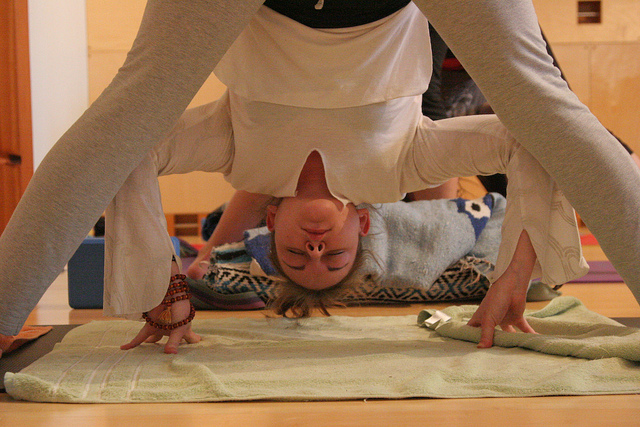The Golden Rule is a universal principle, found throughout all major philosophies and religions.
It states: “Do unto others, as you would have them do unto you.”
As you wish to not suffer, so do all other living beings. In the yoga system, ahimsa is a valuable practice to reduce suffering within ourselves as well as in others.
Ahimsa means “non-violence” in thought, word or deed to all living beings. In The Yoga Sutras, Patanjali explains that when one is firmly established in non-violence, all hostilities cease. With fervent practice, one will emit harmonious vibrations contributing to a more peaceful world.
Here are five ways to kick-start your ahimsa practice:
1. Change negative thoughts.
The key to changing negative thoughts is to first realize that you are not your thoughts. Once you recognize that you are the navigator of your own mind, you can begin to direct your thoughts to reflect peace and harmony. Patanjali recommends the practice of pratipaksha bhavana (a.k.a. thought-counter thought). If you have a negative thought come forward in your mind, think of its opposite. For instance, if you’re thinking harmful thoughts, bring forward in the mind loving thoughts. Think of a moment where you’ve felt love and hold the feeling in your heart. Watch as the harmful thoughts dissolve like clouds in the sky.
2. Practice speaking kindly.
Mindfulness is a key to speaking kindly. When interacting with others, notice the thoughts and feelings that surface before speaking. Often times how another person speaks to us is how we speak to them. If they are kind more than likely we are kind in return. If a person speaks harshly we often respond harshly. After all, our interactions with others are reflections of ourselves. Use mindfulness to speak more kindly when interacting with significant others, family, friends and co-workers. We don’t know what others are dealing with mentally or emotionally. Stress is likely the cause for harsh words. With time practicing speaking kindly, you’ll find others will reflect kindness back to you. Also, being kind does not mean that others should abuse you, so use proper discrimination to discern if the interaction requires more firm and, most importantly, truthful language.
3. Practice compassion toward other people in the world.
You might ask, “How can I practice compassion toward people I don’t even know?” Well, that is an easy answer but a sometimes challenging task. Our daily choices have far-reaching impacts on other people in the world. What many of us choose to buy—like clothing and shoes—are often made in sweatshops which are known to violate human rights. Doing research on the products you purchase and their impacts on other people can help you make more compassionate choices, like buying from fair trade or second hand stores.
4. Practice compassion toward animals.
Even though humans experience wonderful feelings when interacting with animals, they still have it tough on this planet. Animals are often at the mercy of humans. They are forcibly confined, their habitats destroyed and their right to life according to their own needs and desires are stolen. There are numerous ways to practice compassion toward animals—including proper care of our companion animals, choosing products that are not tested on animals and eliminating animal products from our diets.
5. Practice compassion toward the earth.
The earth is in a fragile state. Depletion of natural resources, deforestation, mass pollution and climate change are just a few issues that are compromising the well-being of all living beings on the planet. Just walking down the sidewalk in your own neighborhood—it’s not unlikely you’ll come across plastic bottles and other waste products lurking near ditches. If not properly disposed of, this waste ends up in the world’s oceans to stew in the gyres. By taking compassionate action, including reducing plastic consumption, conserving water and electricity and buying only what you need—you will contribute to a healthier and happier world.
Ahimsa is a work in progress—don’t expect to drastically change over night. It takes time to reinforce new thoughts and behaviors, but don’t let that discourage you.
As Colleen Patrick Goudreau says, “Don’t do nothing, just because you can’t do everything.”
Each compassionate action you make is far-reaching. Think of the butterfly who is influential in the formation of a hurricane just by fluttering her wings.
Today, choose one peaceful thought and one peaceful action for other beings. Over time, watch your influence reach out into your personal relationships and society. You will see an abundance of peace reflect back to you.
Peace begins with you!
.
Relephant Reads:
The Brilliance of Ahimsa: How a Cockroach Can Save Humanity.
The Magical, Secret Lives of Snails.
~
Author: Margie Pacher
Apprentice Editor: Kara Bezuko/ Editor: Yoli Ramazzina
Photo: Flickr/kellinahandbasket
.



Read 0 comments and reply